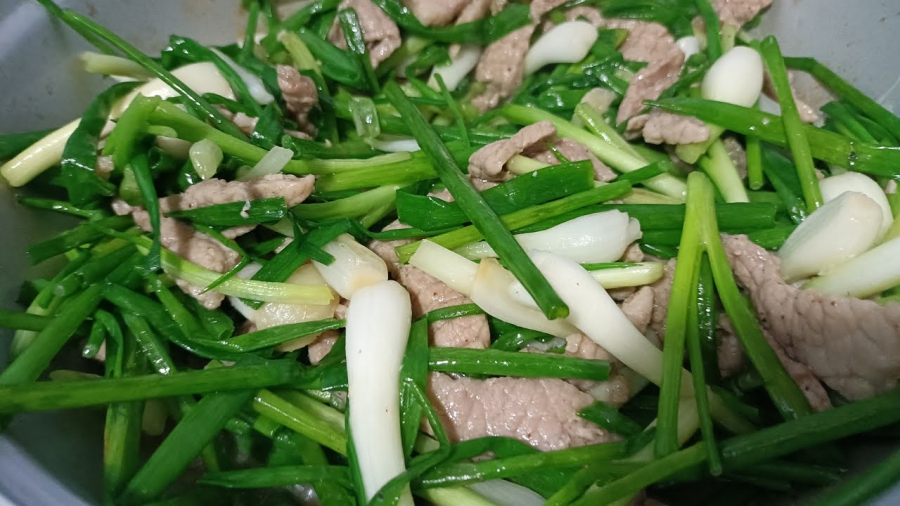Green onion is an essential ingredient in many Asian dishes, from stir-fries, soups, and stews to using it fresh. This type of onion is especially popular for its mild and pleasant aroma, unlike regular onions, and can be used raw or cooked as a vegetable. Green onions not only enhance the flavor of every meal, but they also offer many health benefits that you may not be aware of.
Blood sugar control
Green onions are considered a beneficial herbal option for people with diabetes because they contain “plant insulin.” Green onions contain allylpropy disulfide, a compound that enhances the activity of insulin in the body, helping to reduce blood sugar levels to a stable level. In addition, green onions are rich in chromium, a beneficial trace element that enhances the cell’s response to insulin. Clinical studies have shown that chromium can help reduce blood glucose levels, thereby reducing the amount of insulin needed and supporting diabetes prevention. The sulfur compounds in green onions also play a role in reducing blood glucose, effectively preventing diabetes.
Therefore, adding green onions to your daily diet is a convenient and effective way to reduce the risk of developing diabetes.

Adding green onions to your daily diet is a convenient and effective way to reduce the risk of developing diabetes
Cancer prevention
Green onions are a valuable food in the fight against cancer due to their content of allium, which has the ability to inhibit the growth of cancer cells, especially in the stomach. Known for their high flavonoid content and allyl sulfide compounds, green onions can counteract free radicals, effectively preventing the development of cancer cells.
In Southern Europe, consuming green onions has been associated with a significant reduction in the risk of various types of cancer. Specifically, eating onions can reduce the risk of oral and throat cancer by 84%, esophageal cancer by 88%, laryngeal cancer by 83%, and up to 25% risk of breast cancer. In addition, there is a 73% reduction in the risk of ovarian and prostate cancer, along with a 38% reduction in the risk of renal cell carcinoma compared to non-consumers or low consumers of onions.
Infection prevention
In the history of medicine, onions and garlic have been used not only as a seasoning in cooking but also respected as natural remedies for many diseases. This is due to their ability to kill bacteria, fungi, and viruses. Modern research has shown that when extracted and used at high concentrations, onions can kill or inhibit the growth of harmful bacteria such as salmonella and E. coli, contributing to effective infection prevention.

Onions can kill or inhibit the growth of harmful bacteria
Aid in blood clotting
Green onions are not only a popular herb in cooking but also a rich source of vitamin K, an essential nutrient for the body. Vitamin K plays an indispensable role in the blood clotting process, preventing uncontrolled bleeding. Even with a small intake, half a cup of green onions provides enough vitamin K for physiological activities related to blood clotting, supporting cardiovascular health and the circulatory system.
Protecting strong bones
Green onions are not only famous for their distinctive flavor but also a rich source of vitamin K and C, with 12 grams of green onions providing up to 20 micrograms of vitamin K and 1.6 mg of vitamin C. These nutrients play a crucial role in promoting the development and maintenance of strong bone structure. Women, in particular, can minimize the risk of osteoporosis and the risk of fractures through the daily addition of green onions to their diet, not only for direct benefits to the bones but also for helping to control blood sugar levels, thereby contributing to overall health.

Green onions are a rich source of vitamin K and C
Heart protection
Green onions have been highly regarded by nutrition experts in the United States for the benefits they bring to the cardiovascular system. They contain chromium, vitamin B6, and sulfur, which help reduce cardiovascular risk factors such as triglycerides and LDL cholesterol, also known as “bad cholesterol”. This supports the prevention of cardiovascular diseases, including coronary artery disease, one of the leading causes of death. Moreover, with a high content of vitamin C, green onions are also a potent antioxidant that helps protect DNA and cells from the damage of free radicals. To support a healthy heart, incorporating green onions into your daily diet is a simple yet effective measure.
Support gut health
































